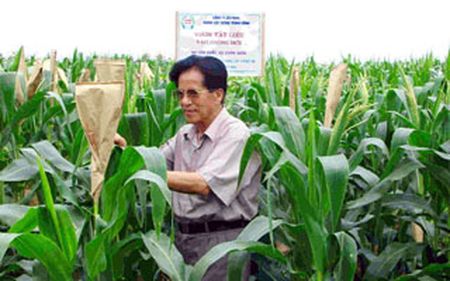

The GM maize MON 98034, for example, has been granted a certificate of biosecurity which could pave the way for the import of the maize variety in large quantities for large-scale cultivation in Vietnam.
However, the debate about the effects of GM technology on Vietnamese agriculture remains inconclusive.
Dr. Tran Hong Uy, former head of the Maize Research Institute, an arm of the Ministry of Agriculture and Rural Development (MARD), said it would be a blunder to import GM maize varieties to grow in Vietnam now.
Uy said that the average yield of GM maize varieties is not higher than that of Vietnamese varieties. They each yield 8-10 tons per hectare.
He said GM maize must not be a solution to Vietnam’s animal husbandry or to hunger elimination and poverty reduction, as MARD hopes it would be.
“Developing GM crops will make Vietnamese farmers more dependent on foreign seed suppliers,” he said. “GM crops will not help increase productivity and reduce cultivation costs, and they will spoil the ecological environment and biodiversity in addition to harming people’s health.”
“GM maize varieties will not help solve existing problems, because they can’t improve productivity, and are not drought-resistant. They are weed- and insect-resistant, but these are not big problems for Vietnam,” he added.
An agriculture expert, who asked to be anonymous, also said he cannot understand why MARD repeatedly urges the import of GM maize varieties.
“Why should we import GM maize varieties if some domestic research institutes are also working on GM crops?” he said. “Why should we import GM maize varieties if we have been warned that this would make us rely more heavily on foreign supply sources?”
“Why should we insist on GM crop development if Europe protests against genetically modified organism (GMO), while India and China are having problems with GMO?” he added.
Dr. Tran Dinh Long, chair of the Vietnam Plant Seed Association, confirmed that the licensed GM maize variety can only resist insects and weeds, while the yield is not high. What Vietnam needs is a maize variety which can grow in drought and give high yield, he said.
Long believes that it would be better to develop the existing Vietnamese hybrid maize which can yield eight to 10 tons per hectare, instead of using the GM maize varieties as all the risks of the varieties cannot be foreseen.
Uy also thinks that hybrid maize varieties that Vietnamese scientists have found are the solution for the animal husbandry sector.
According to Uy, the varieties have outstanding advantages, including reasonable seed prices, high yields, and high-quality produce. They are also easily adaptable to different land areas and can be stored for a long time.






